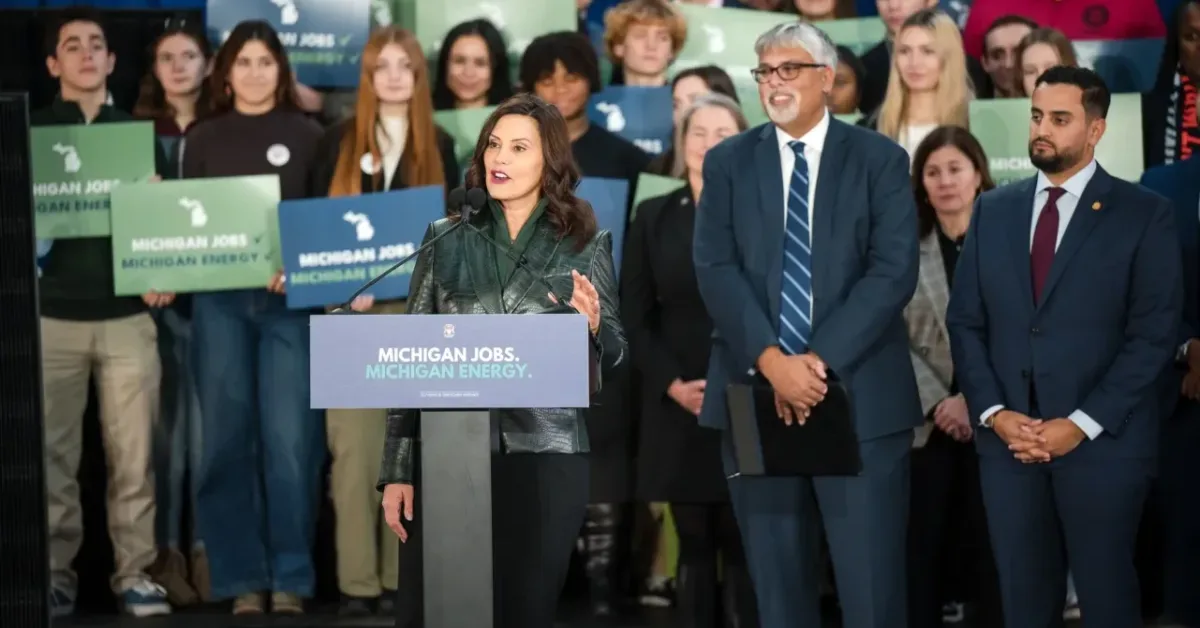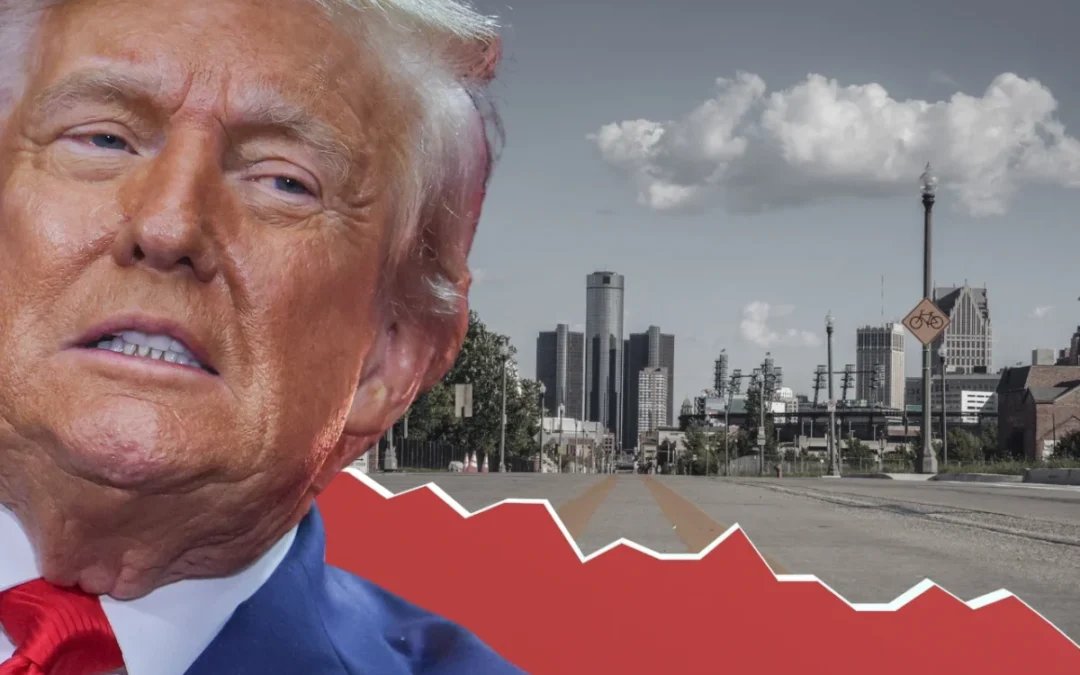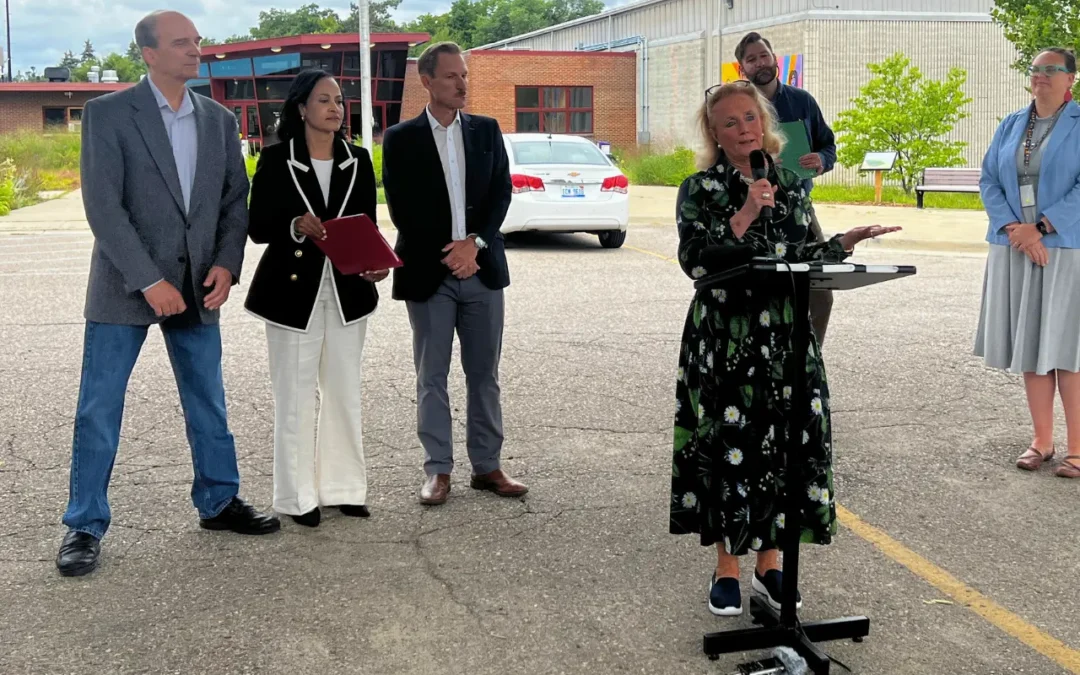
Michigan is at the center of an electric vehicle revolution. Gov. Gretchen Whitmer’s administration wants to ensure every community—and worker—is ready for what’s en route.
MICHIGAN—Automotive manufacturing ain’t what it used to be.
Recent reports show that companies have invested more than $165 billion to expand electric vehicle (and battery) manufacturing nationwide over the last eight years as the automotive industry transitions toward cleaner energy and a more environmentally sustainable future.
Michigan, as the auto manufacturing capital of the world, has emerged among the states leading the charge in that electric revolution—with more than $19 billion in EV-related investments announced in the state since 2015, set to spur the creation of 20,000 new jobs.
For now, that means Michigan “is still the best place in the world” to get a manufacturing job, said Jonathan Smith, chief deputy at the state Department of Labor and Economic Opportunity.
But as the clean energy transition continues, state officials aren’t taking anything for granted.
“If we don’t get ahead of economic change, we might fall behind,” Smith told The ‘Gander. “We want to make sure that we’re doing more than just helping folks if there’s a negative outcome in the economy. We really want to empower everyone—so that we can all have a plan to benefit from the economic growth that will be created by these new advancements in technology.”
This week, Gov. Gretchen Whitmer announced the launch of a new state office that’s designed to do exactly that. It’s called the Office of Community and Worker Economic Transition.
Among the primary goals of the new office: Ensure every Michigan worker can proactively prepare for—and benefit from—changes coming to the state’s economy as more automakers and parts manufacturers accelerate the transition to an electric-powered future.
“Michigan is poised to lead the future with an abundance of jobs in clean energy,” Whitmer said in a statement. “The new Economic Transition office will allow us to fully realize this potential.”
Here’s the deal:
According to the World Resource Institute, as many as 56,000 EV-related manufacturing jobs could arrive in Michigan over the next 16 years, and the state is poised to see as many as 167,000 new clean energy jobs in total over the next decade.
But those new jobs in Michigan won’t mean much if Michigan workers aren’t prepared for them.
Smith said the new office will employ a team of people who will raise awareness of existing state resources—like the state’s Electric Vehicle Jobs Academy—to help connect more Michiganders with tuition-free college degrees, paid skills training, and opportunities for high-wage jobs.
He also wants to partner with community leaders to design new programs that fill the gaps, helping train more Michiganders to keep up with the demand for clean energy technology.
“If you look at the investments we’ve already seen come online, it’s obvious that our automakers are looking to Michigan to invest,” Smith said. “If you want to do innovation or production in the auto industry—whether it’s on the research and design side or the engineering side—this is still the best place in the world to do it. The goal of this office is to make sure that never changes.”
Whitmer said the new state office will also make “intentional investments” in the research and development of clean energy technology, as well as provide financial support—like grant funds—to manufacturers who can connect more Michiganders with “high-tech, high-wage jobs.”
State officials said that Whitmer’s latest budget proposal calls for $2.5 million in one-time funding to get the office started, along with an additional $5 million on a recurring, annual basis.
That will include funding for manufacturers to retool their equipment and retrain their employees for both electric vehicle manufacturing and the development of new clean energy technology.
Smith said state support will be focused primarily on small and medium-sized businesses, women- and minority-owned businesses, as well as Michigan businesses that pay good wages, provide decent benefits, and are generally committed to the fair treatment of their workers.
“The new office will not only allow us to effectively address the shifts happening in the utility and auto sectors, which are vital components of our state’s economy, but it will also ensure the communities, workers, and employers who stand to be impacted the most from these changes have the tools and support they need to take advantage of this new future,” Smith said.
Why now?
Whitmer signed legislation into law last November creating new clean energy standards for all of Michigan’s electricity providers that will require them to source most—and eventually all—of their energy through renewable sources over the next 16 years.
Federal legislation signed by President Joe Biden has also dramatically accelerated investments in electric vehicle and battery manufacturing—with more than $85 billion in investments announced since the passage of the Inflation Reduction Act in the summer of 2022.
Grants and incentives included in that legislation have enticed hundreds of manufacturers to announce nearly 180,000 EV-related jobs across the country, including thousands in Michigan.
To best leverage those federal dollars and ensure Michigan workers were lined up for success during the transition, state Democrats passed Senate Bill 519, which officially became a state law this week and called for Whitmer to create the new Office of Community and Worker Economic Transition within the Michigan Department of Labor and Economic Opportunity.
Smith said the new office is designed to ensure that all Michigan communities, workers, and employers have the support they need to survive—and thrive—during the transition, particularly as electric vehicles continue to account for a larger share of new vehicle sales nationwide.
“The best thing we can do is start early,” he said. “Internal combustion engines aren’t going anywhere in the near future, and so I think that means we have a lot of time to prepare.”
The bill that created the new office reportedly received a variety of supportive testimony from members of the United Auto Workers union, the AFL-CIO, and other labor groups.
“Good union auto and manufacturing jobs are part of Michigan’s DNA and are what put the world on wheels and gave rise to the American middle class,” said AFL-CIO President Ron Bieber. “As we race to combat climate change and make Michigan a leader in clean energy, this office will help make sure the workers who built this state are part of building its future.”
Beyond setting new clean energy standards and creating a new state office, the new laws taking effect this month are set to lower household utility costs for Michiganders by an average of $145 annually and lure nearly $8 billion in federal tax dollars to Michigan for clean energy projects.
READ MORE: New clean energy laws to cut utility bills for Michiganders
For the latest Michigan news, follow The ‘Gander on Twitter.
Follow Political Correspondent Kyle Kaminski here.
Support Our Cause
Thank you for taking the time to read our work. Before you go, we hope you'll consider supporting our values-driven journalism, which has always strived to make clear what's really at stake for Michiganders and our future.
Since day one, our goal here at The 'Gander has always been to empower people across the state with fact-based news and information. We believe that when people are armed with knowledge about what's happening in their local, state, and federal governments—including who is working on their behalf and who is actively trying to block efforts aimed at improving the daily lives of Michigan families—they will be inspired to become civically engaged.


Trump’s tariffs cost Michigan another 300 manufacturing jobs—and a $50M factory deal
Michigan workers were promised more jobs under President Donald Trump’s tariffs. Instead, they’ve been losing them. MICHIGAN—A plan to bring 325 new...

Nessel seeks to slash DTE half-billion-dollar rate hike request by 75%
BY BEN SOLIS, MICHIGAN ADVANCE MICHIGAN—Attorney General Dana Nessel filed testimony on Friday in DTE Energy’s latest rake hike request, which is...

Michigan leaders say Trump’s hatred of clean energy will hike utility bills, kill jobs
Clean energy advocates say President Donald Trump’s “One Big Beautiful Bill Act” is raising utility costs, canceling solar projects, and putting...

Here’s how many Michiganders in Flint and the Tri-Cities will lose SNAP benefits in 2025—and the elected politician who tried to stop it
Trump’s tax bill will take around 46,000 people off SNAP in Michigan’s 8th Congressional District. Rep. Kristen McDonald Rivet voted against it....

Here’s how many people in Southwest Michigan will lose SNAP benefits in 2025—and the elected politician who made it happen
About 25,000 people in the Holland-Kalamazoo region are waiting to hear if Rep. Bill Huizenga will run for reelection in 2026, after he voted to...





